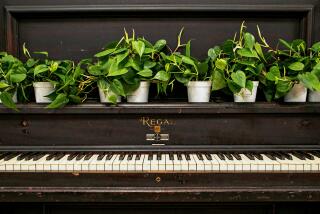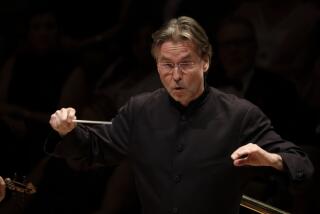Andras Schiff Brings Baroque Back to the Piano
- Share via
NEW YORK — Andras Schiff’s modest Upper West Side apartment tells you very little--and in the not telling, maybe quite a lot--about its inhabitant. The furniture is plain, generic. There is a low-fi stereo, along with a few records. “Satanic Verses” sits alone on the coffee table. The main presence in the room is the grand piano.
It seems, perhaps, a good place to practice Bach without distraction, but it hardly seems like home to one of the leading pianists of his generation, even for one who has almost singlehandedly wrested Bach from the iron grips of harpsichordists and made it respectable once more to play Baroque music on the piano.
And it really isn’t home. Schiff also, it turns out, has residences in London and Salzburg, cities you are more likely to find him in than New York.
Nor do his spare surroundings indicate a tunnel-vision obsession with Bach. The young Hungarian pianists doesn’t consider himself a Bach specialist, close as he is to the music. And to prove it, his belated Los Angeles recital debut tonight at Ambassador Auditorium, will consist of a curious mix of Haydn and Bartok.
What Schiff’s environment does convey, however, is a musician who does not readily exhibit his own personality, something this writer also discovered during a conversation in which Schiff discussed musical issues thoughtfully but during which the pianist never loosened his guard or gave any evidence of his reputation for a lusty and wicked sense of humor.
Instead, in conversation Schiff proves studied, lucid and maybe just slightly impersonal, the very qualities for which his best-selling London recordings of Bach have been prized.
But that, too, is deceptive. Schiff says that his way of playing Bach on the piano in an age that places such regard on authentic instruments is to respect the style behind the music.
“We should just listen to the interpretation and the message of the music and forget about the instrument,” he says.
For Schiff, it is all a question of translating--through varieties of touch and of phrasing--18th-Century notation into present-day terms. He complains about ignorant pianists who don’t understand that much of the character of Bach’s keyboard music lies in 18th-Century dances.
“If you are interested in the music,” he stresses, “then you must go behind the notes and find out as much as you can about the music, the style, the whole culture and history.’
This attitude of understanding music within a context, Schiff emphasizes, is what also informs all that he plays. In November, for instance, Schiff gave an attention-getting recital at Wigmore Hall in London, the kind of program that got cover story prominence from British music magazines and that attracted such notable pianists as Alfred Brendel.
For the first half, the pianist was joined, unusually, by soprano Lucy Shelton, for Gyorgy Kurtag’s 45-minute, arrestingly intense “Bornemisza” Concerto for soprano and piano, and Schiff followed that with Beethoven’s “Hammerklavier” Sonata.
So strenuous was the program that Schiff looked dazed by the end of it. When asked what possessed him to attempt such a punishing program, he says that Kurtag, a Hungarian composer he knows and greatly admires, had been listening to the Beethoven while composing “Bornemisza,” and both “fiendishly difficult pieces,” he says, “have the same element of struggle.
It is such a context that Schiff hopes to create with his Haydn/Bartok pairing at Ambassador. What is unusual about this program is that the two composers will be juxtaposed throughout the recital, interspersing works by Bartok between the last three Haydn sonatas. Schiff takes great pride in his programming.
“I have absolutely no talent to compose,” Schiff laments. “But I can be creative in other ways, such as trying to put together sensible and interesting programs.” Moreover, he feels that it is his duty and pleasure to try to popularize neglected music, and that even means Haydn.
“I wouldn’t say that Haydn is unknown, but it’s almost as bad as that,” the pianist says. “People know of Haydn but they always put him in the shadow of Mozart. As much as I worship Mozart, I really think that Haydn is his equal and even much more revolutionary.
More to Read
The biggest entertainment stories
Get our big stories about Hollywood, film, television, music, arts, culture and more right in your inbox as soon as they publish.
You may occasionally receive promotional content from the Los Angeles Times.











